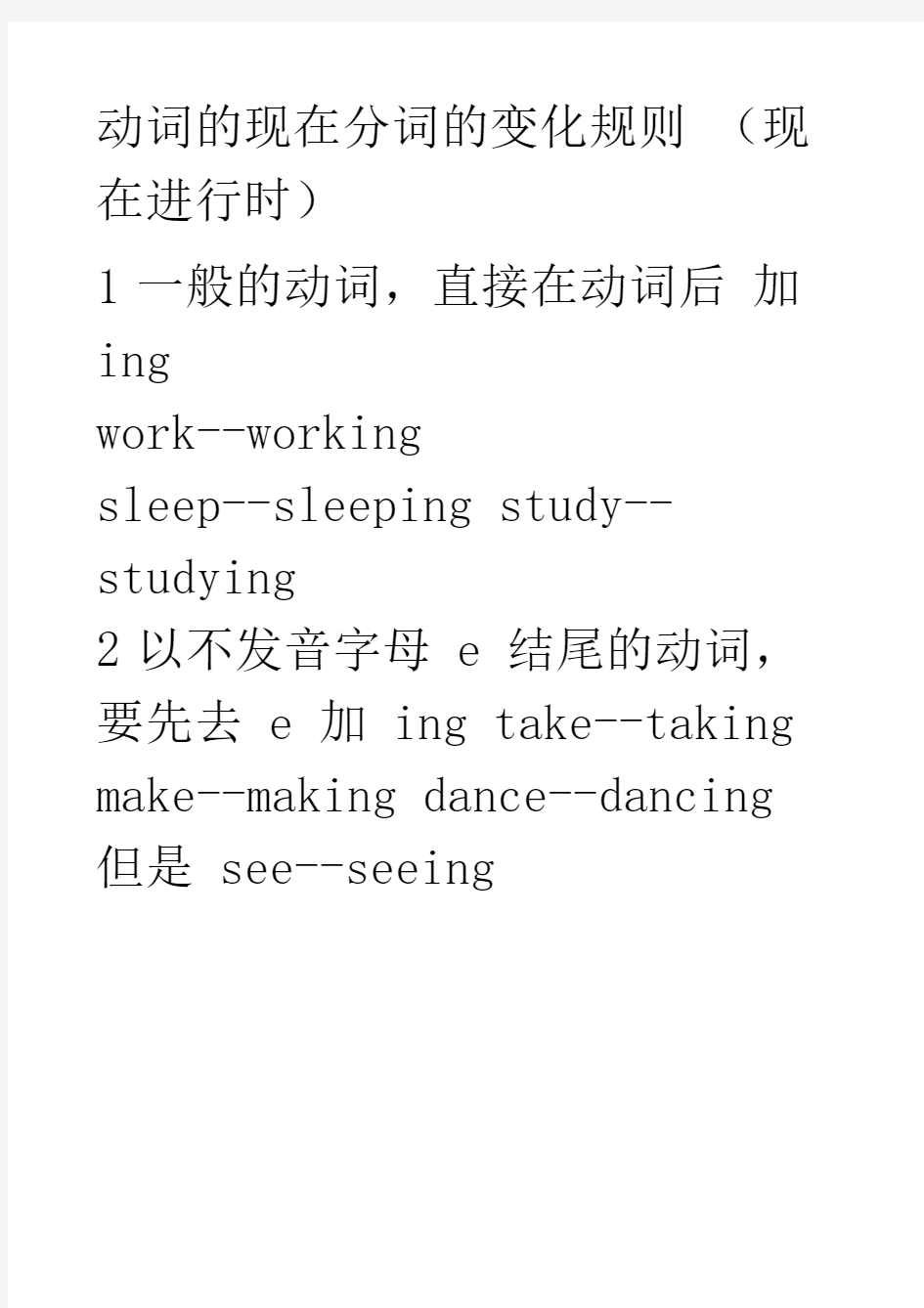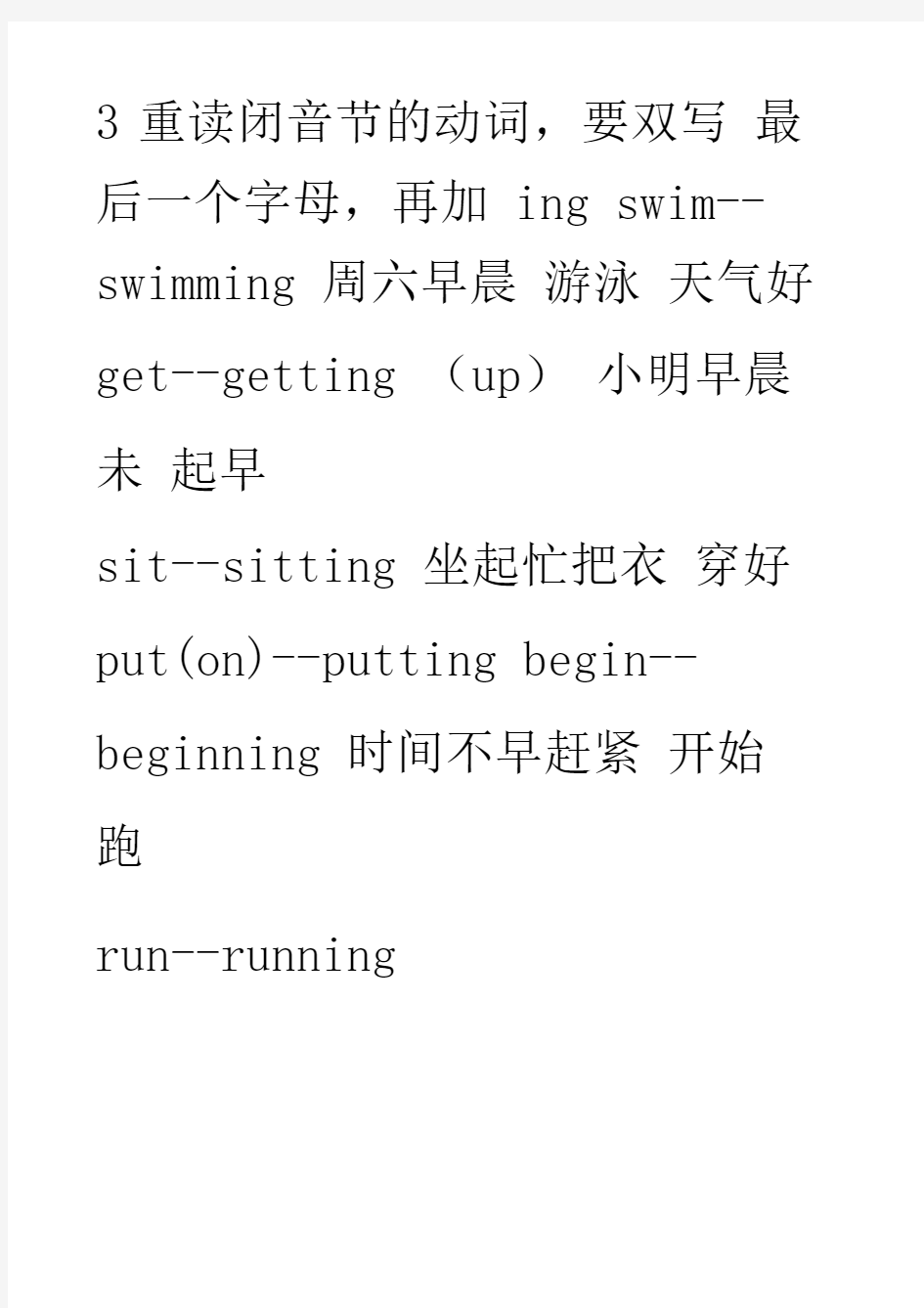动词的现在分词的变化规则


动词的现在分词的变化规则(现在进行时)
1一般的动词,直接在动词后加ing
work--working
sleep--sleeping study--studying
2以不发音字母e 结尾的动词,要先去e 加ing take--taking make--making dance--dancing 但是see--seeing
3重读闭音节的动词,要双写最后一个字母,再加ing swim--swimming 周六早晨游泳天气好get--getting (up)小明早晨未起早
sit--sitting 坐起忙把衣穿好put(on)--putting begin--beginning 时间不早赶紧开始跑
run--running
forget- - forgetting 忘带午饭又把商店找
shop--sh opping stop-st opping cut--cutting 停止剪发就逃跑
4以ie 结尾的动词,扌 为y 再加ing lie-
lying tie-tyi ng die-dying 死
一般现在时
1. 概念:表示经常性或习惯性的动作或存在的状态。
2. 一般现在时常常与下面这些时间状语连用: always ( 总是 )usually ( 通常) often ( 经常 )sometimes ( 有时 ) seldom (很少)never
把ie 变 平躺/说谎 系,捆(鞋带,领
(从不) once/twiceaweek(一周一/ 二次)everyday/month/year 每天/ 每月/ 年
3.当主语不是第三人称人称单数时,主语后面的动词用动词原形,不需做任何变化。如:
I gotoschoolbybuseveryday.
I haveapenandabook. WewatchTVeveryday. Youhavealotofmoney.
Theyoften dotheirhomework.
4.当主语是第三人称单数时,主语后面的动词需要做相应的变化.
即在动词后面加s 或es 或把have 改为has 3. 第三人称单数,动词的变化规则:
(1)一般动词后面直接加s 如:play-play slike-like s Sheusuallysing ssong. (2)动词以s,x,ch,sh,o 结尾的加-es
女口:watch-watch esgo-goes wash-washesdo-do es Hegoestoschoolbybus.
(3)以辅音字母加y结尾的动词,把y改为i
■再力口- es
如:fly-fl i esstudy-stud i es Lipingstud i eshardatschool.
4.如果要把一个含有be动词的句子,变为一般疑问句,直
接把be动词提到主语的前面
即把(is,am,are,was,were
)直接面,句末用问号。
5.如果要变为否定句,直接在be
(IS,am,are,was,were)动词后面加not ”。
女口:Mary is agoodstudent.
Is Maryagoodstudent
Yes ,she 1s .(前面肯定,后面肯定)
回答前后要一致
No ,she iSn't .(前面否定,后面否定)
Maryis n' agoodstudent.
We are students.
Are youstudents
Yes ,we 30.(前面肯定,后面肯定)回答前后要一致
No ,weare n't .(前面否定,后面否定)
Weare not /are n't students.
3.如果句子中没有be动词,就必须借用do或does 。do(主语不是第三人称单数)
助动词J
提到主语的前
does(主语是第三人称单数)
一般疑问句:就把do或does提到主语之前。
如:Theyhavelunchat12:00.
They don' tavelunchat12:00.
Do theyhavelunchat12:00
*5.主语是第三人称单数时,需要借用助动词does
变为一般疑问句:将Does提到句子的开头
变为否定句:在主语后面加does't
借用助动词does之后,原来的动词倒回去用原形。即去掉
s或es或把has变为have
女n:Je nnysp eak s En glishverywell.
Does JennyspeakEnglishverywell
Jenny doesn' t peakEnglishverywell.
Mikewatch es TVeverynight.
Does MikewatchTVeverynight
Mike does n't watchTVevery ni ght.
She has lunchatschooleveryday.
Does she have lunchatschooleveryday
She does'thave lunchatschooleveryday.
一般过去时
1.概念:
表示过去某个时间里发生的动作或存在的状态;
2.规则动词的变化规则:
①一般的动词直接在其后加ed。
女0: want ed , play ed 。
②以不发音的字母e结尾的动词,直接加d。
如:hope d, live d。
③需要双写最后一个辅音字母,再加ed。
如:skip 7skip p ed (跳绳)trip trip p ed (绊倒)
travel 7trave lled (旅游)plan 7pla nned (计戈U)stop 7stop ped (停止)beg 7beg ged (乞
讨)
④以辅音字母+y结尾的动词变y为i,再加ed。
如:stud ied ,worr ied 。
3.过去时态结构基本形式
肯定句:主语+动词过去式+其他;
否定句:① was/were+not;
②在行为动词前加did n't ,同时将动词倒回去用动词原形;
一般疑问句:Did+主语+do+其他。
般将来时
l.bego in gto +动词原形
2.will/would +动词原形
3.shall/should+ 动词原形一般将来时:表示将要发生的动作或存在的状态。
肯定句:主语+will+动词原形。
WewillgotoBeiji ngtomorrow.
否定句:在will的后面加not即可。
will not 可缩写为won t
Theywon tcomeintwoweeks.
一般疑问句:把will提到主语之前,句末用问号。
Willyougotoschooltomorrow
特殊疑问句: 特殊疑问词 +will+ 主语+动词原形。。。?
Whatwillwanttodointhefuture
Therebe ”句型的一般将来时
肯定句: Therewillbe+ 名词 +其他成份
[注意]:无论后面加单数名词或复数形式, be 都必须用原形。
Therewillbeonlyonecountry.
Therebe 句型不能与 have/has/had 任何一个连用
A.have
B.tohave
C.be
D.had
否定句:在 will 后面加 not.
Therewon 'tbeonlyonecountry.
基数词:表示数量的词( 1,2 ,3 。。。) 数词 序数词:表示顺
序的词(第一 /二/三。。。)
? 一般有:基数词+th -序数词(规则变化)
four ( 四) - four th (第四) six (六)—six th (第六)
seven ( 七) - seven th (第七)
ten ( 十) - ten th (第十)
eleven ( 十一) eleven th -(第十
** 不规则变化的
one ( 一) -first ( 第一)
two ( 二) — second ( 第二)
three (三)—third (第三) five (五)—fifth (第五)
eight (八)—eighth (第八)
如:
Therewill afootballmatchtomorrow.
nin e(九)—ninth (第九)
twel ve (十二)—twel fth(第十二)
三.从13 —19的基数词,都在个位数后加teen构成
14—four teen
15—fif teen
16—six teen
17—seve n tee n
18—eigh teen
19—nine teen
四.整十的序数词,变y为ie再加th
20twenty —twent ie th 第二十
30thirty —thirt ie th 第三十
40 for ty —fort ie th 第十四
50fifty —fif t ie th 第五十
60sixty —sixt ie th 第六十
70seventy —sevent ie th 第七十
80eight —eight ie th 第八十
90ninety —ninet ie th 第九十五.分数的表达:分子用::基数词
分母用:序数词特别要注意:当分子大于1 时,分母要用:复数
1/2onesecond 1/12onetwelfth 7/8seveneighth s 3/5threefifth s
加减乘除表达adecimalnumber 小数
afraction 分数
apercentage 百分数
aoddnumber 奇数
anevennumber 偶数
degrees 度数
1.力卩:and;plus;addto 2+4=6
Twoandfouris/equalssix.
或Twoplusfouris/equalssix.
或Twoaddedtofourequalssix.
2.减:minus;subtractfrom8-3=5
Eightminusthreeis/equalsfive.
或Threesubtractedfromeightisfive.
3.乘:multiply...by;
mult ip Iiedby/times3 x 5=15
Multiplythreebyfiveis/equalsfifteen.
或 Threemultipliedbyfiveis/equalsfifteen.
4. 除:divideby.../divide...by (24)
Twe nty-fourdividedbyeightis/equalsthree.
或 Divide24by8is/equalsthree.
祈使句
一、 祈使句的概念
表示请求、命令、建议等的句子叫祈使句。它的主语是 听话人(you),一般不需要说出来。通常以动词原形开头 祈使句末
尾用惊叹号或句号,句子用降调。 二. 肯定祈使句
Open thedoor, pl ease. 请把门打开。
Standup,p lease./Sitdow n,p lease. Hurryu p! 快点跟上。
二、 否定祈使句 祈使句的否定式是在动词原形前加do n't 女口:
Don' tbelateagain. 不要再迟到了。
PIeasedon ' tforgetme. 请另忘了我。 Do n'thateme. 别恨我 Don 'tworry! 别着急!
三、 肯定句 Let ' s...让我们
让我们/我
—Letusgoswimmi ng,willyou 请你让我们去游泳,好吗? 练习题:按要求改写下面的句子。
a 号Letus/me...
否定句Let's/m 哥not ...让我们不做。。。
Letus not ...让我们不做
P leaseletmego. 让我走 —Let '
sgoswimming, 我们去游泳,好吗? o shallwe
I.Weshouldgotoschoo Ion time.( 肯定祈使句)
2.Becarefull.( 改为否定祈使句
3.You musttakecareofthecat. 定祈使句)
名词单数变复数规则
一、 一般的可数名词的复数形式,直接在其后加
二、 例:friend f friends 朋友;cat f cats sport f sports 运动;piece f pieces
张/片 三、 二、凡是以s 、X 、ch 、sh 结尾的词,在其后加-es 例: bus f buses 公车;fox 狸;match f matches
四、 三、辅音字母+y 结尾的名词,变y 为i ,再加-es
五、 例:can dyf can dies 糖果
lady T ladies
小姐/女 四、以-o 结尾的名词,
(改为否 -s 。 猫 f foxes 狐
比赛,dish >dishes 盘子
story T stories 故事
例:tomato f tomato es 西红柿
potato T potato es
"photo T photo s 相片kilo T kilo s 公斤
V
>hero s英雄
pano T piano s 钢琴hero
五、凡是以-f或-fe结尾的名词,变-f或-fe改变
为-V再加es 例: knife T kn ives 小刀;life T iVes 生命但有例外:如roof Troof s屋檐handcuff s手铐
不规则变化的名词:
m a nTm en 男人
wom anTwom en 女人
policem anT policem en 男警察
policewom an^policewom en 女警察
child T child ren 小孩
foo t Tfee t 脚
t00 th ftee th 牙齿 , g 00 sefg ee se 鹅 m ous e^m ic e 老鼠/鼠标
七.单复数一样的名词:
sheepf sheep
绵羊
deer f deer 鹿
fish ffish 鱼
pe0ple f pe0ple 人
Chinese 中国人 Japanese f Japanese
( 在前面也不能用 a 或 an ) 下面都是错误的,如: rices 米饭 teas 茶 awater 水 anair 空气 ameat 肉 不可数名词作 主语 ,谓语要用 单数 形式。 如: water is imp0rtant. Chinese f 本人
不可数名词(没有复数形式即不能在其后加 s 或 es )
